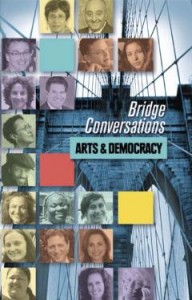“The Arts & Democracy Project builds the momentum of a cultural movement that links arts and culture, participatory democracy, and social justice. We catalyze and support cross-pollination between sectors, cultures, and generations.”
If you run across an online dialogue between activists and artists who you never suspected would connect, or a national gathering of cultural organizers, you may very well find the Arts & Democracy Project behind it. This eclectic collective of consultants — cultural organizers, artists, advocates, writers — is connecting strands of a growing web among those working towards creative social transformation.
 A&D is a project of State Voices, which
builds networks among progressive grassroots organizations. It was founded in 2005,
emerging from a major voter registration initiative, and is directed by Caron Atlas, a
long-time cultural organizer and consultant who has worked with groups such as Appalshop, Animating Democracy, and
Fractured Atlas.
A&D is a project of State Voices, which
builds networks among progressive grassroots organizations. It was founded in 2005,
emerging from a major voter registration initiative, and is directed by Caron Atlas, a
long-time cultural organizer and consultant who has worked with groups such as Appalshop, Animating Democracy, and
Fractured Atlas.
Each of A&D’s projects uses a different medium for linking people and igniting dialogue within and across fields. This work is desperately needed in the dispersed and siloed realm of cultural organizing, which is after all not so much its own separate field as a hybrid of fields that often do not communicate, such as community organizing and community arts.
Since its inception A&D has run a number of convenings across the country, bringing people together around topics like hip-hop activism and grassroots cultural organizing. In 2008 they facilitated a series of online “Bridge Conversations” that put individuals from disparate fields in conversation, and which have been collected into a book titled Bridge Conversations: People Who Live And Work in Multiple Worlds. The book is available as a pdf or in print form. Every other month A&D hosts a conference call where people can share work on a specific topic in the realm of arts and activism. These calls are recorded and avaiable online; the most recent was a discussion of art and culture in the Occupy movement. Finally, they have a small collection of profiles of cultural organizing groups.
Together, these are some of the best cultural organizing resources on the web, and will introduce you to so many individuals, projects, and organizations across the country. In fact, it was through a Bridge conversation that I was first introduced to the term “cultural organizing.” To keep up with their work, I highly recommend signing up for their e-newsletter.


